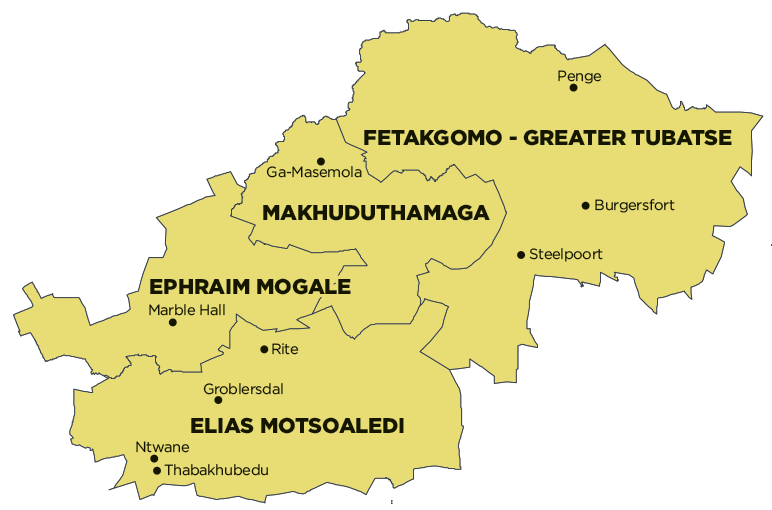
Geography, History & Economy
Ephraim Mogale Local Municipality is part of Sekhukhune District Municipality.
MDB code: LIM471
Description: The Ephraim Mogale Local Municipality is a Category B municipality situated within the Sekhukhune District in the Limpopo Province. It is the smallest of the four municipalities in the district. It was established after the 2000 local election, with the amalgamation of Marble Hall, part of Moutse (West) Transitional Local Council (TLC), Leeuwfontein, a portion of Hlogotlou/Lepelle Transitional Rural Council (TRC), Greater Nebo North TRC, a portion of Naboomspruit/Roedtan Thusang TLC, and Springbokvlakte TLC.
The municipality was a cross-border between the Limpopo and Mpumalanga Provinces. After the 2006 municipal elections the municipality was incorporated into the Limpopo Province. The municipality is at the border of the two above-mentioned provinces. It is about 160km from Pretoria and about 190km from Polokwane (previously Pietersburg).
The amalgamation of parts of eight former TLCs also resulted in the establishment of the Ephraim Mogale Local Municipality, with 14 wards, which was increased to 16 wards during the 2011 local government elections. It has one town and two R293 towns, and 75 villages.
The municipality was providing water to Marble Hall, Leeuwfontein and Zamenkomst, which was later transferred to the Sekhukhune District Municipality (SDM). Currently, the municipality is licensed to provide electricity to Marble Hall town, and other areas are provided for by Eskom. The municipality also provides solid waste to Marble Hall, Leeuwfontein and Elandskraal, while the SDM provides water and sanitation to all other areas. The municipality is battling with a huge backlog in terms of water provision, sanitation and road construction.
The average annual rainfall is about 634mm. Marble Hall boasts a pleasant climate, with an average maximum winter temperature of 23°C and an average maximum summer temperature of 29°C.
Area: 2 011km²
Cities/Towns: Marble Hall, Schuinsdraai Nature Reserve
Main Economic Sectors: Agriculture, mining, tourism, construction, trade, transport, finance
